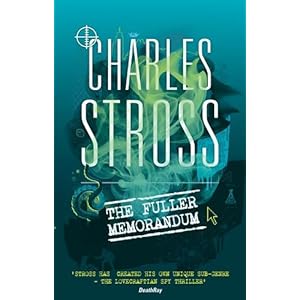I got the first draft done, then took some time out while my beta testers kicked the tyres (I have other jobs to occupy my copious spare time). Now I'm back at work on what I hope will be the final pre-submission draft of "Rule 34".
The first draft, which I finished on the 8th, is not something that is fit to publish. It's a story, certainly: the guts are all there, stitched inside the skin. It's even been spell-checked. (Insert hollow laughter here.) Earlier sections have already been reviewed, edited, and polished to a fine gleam; the last quarter, not so much. But not everything works properly. There are a ton of snags: red herrings that I forgot about part-way through the 15 month long writing process, stuff that isn't needed (and so needs to be cut cleanly away), other stuff that needs to be inserted to foreshadow later scenes — very often the climax of a novel doesn't make complete sense unless the author's taken the time to go back through the book and insert a bread-crumb trail of arrows leading up to the summit. This is especially true of a crime novel (which "Rule 34" undoubtedly is, albeit somewhat unconventional).
And there are more subtle problems. It took me 15 months to write the first draft of this one. Think back to whatever book you were reading 15 months ago. Now, how many of the details can you remember? Try to write a synopsis and you'll probably find (especially if, like me, you have a poor memory) some of the details are blurred. Re-read it and compare what you're reading with the synopsis and you'll probably unearth a number of surprises. This is exactly my position when I go back and edit something I wrote more than a year ago.
Here's another problem. Because I lose the plot every few months (to be honest, I get tired and have to take a break), I start each iterative attempt to spin the novel out by re-reading and editing the earlier sections. After a while I get over-familiar with the text, and lose the ability to focus on those early bits closely enough — while the later sections haven't been re-read and edited anything like as often. So there's a quality control issue here.
Anyway, that's what I've been doing for the past few days, and what I'll be doing for some time to come. The novel exists; it just hasn't passed its QA checks yet. But it should be done by the end of this month (July), a month ahead of the deadline.
After that, what am I going to do next?
Among other things, I've got a couple of unusual book projects to work on. First of all, I'm guest of honour at Boskone in Boston next February. A long-standing annual SF convention, Boskone is run by the New England Science Fiction Association, NESFA. NESFA have their own small press, and one of their traditions is to publish a book by the guest of honour — frequently a mix of fiction and non-fiction. I'm not going to pre-empt their announcement, but I just turned something in. So hopefully that means there'll be a new short-run hardback next February.
Next, I'm going to try and make an April Fool's joke come true.
Back on April 1st, Locus Magazine announced that Cory Doctorow and I were going to write an authorized sequel to Atlas Shrugged. As it happens, we don't have the permission of the Ayn Rand estate, but we're not going to let a little thing like that stop us! A couple of years ago we wrote a couple of fun novellas, collectively titled "The Rapture of the Nerds"; we plan to finish the long-planned and long-overdue novel, for publication in 2012 by Tor. (Locus editors: the joke's on you now!)
Finally: I have a superstitious dread of talking in public about projects that aren't under contract yet, just in case the deal falls through. (This happened to what very nearly became my first published novel, back in 1992.) Ace and Orbit won't discuss future books until I finish my current contract workload — that's how this business works. But what I am willing to say is that I'm aiming to hand in "Rule 34" in about nine days' time. Assuming all goes well, shortly thereafter I hope to announce a new two-book deal. I'll be pitching for a fourth Laundry novel, and a new far-future SF title. Here's hoping they like the idea ...


